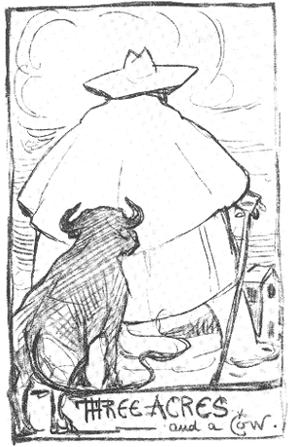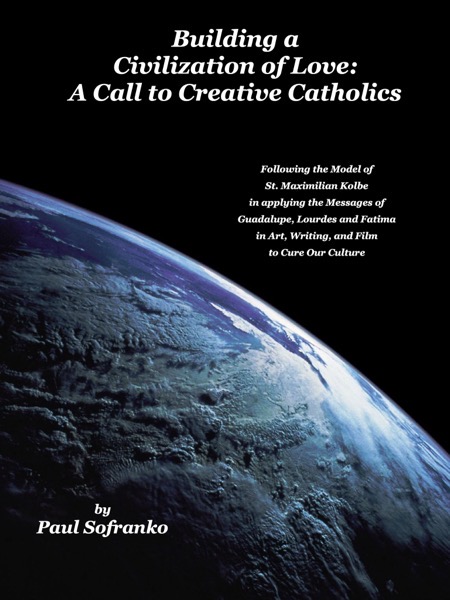In my new book, The Catholicpunk Manifesto, I refer to Peter Maurin a few times. He was the co-founder of the Catholic Worker Movement with Servant of God Dorothy Day.
Of the things he contributed to the CW Movement, two stand out: his “Easy Essays,” which were short verses that explained complicated concepts. The other was his “Agronomic Universities,” where scholars and farm laborers would work together. Scholars would spend time on CW farms (the “Universities” in the idea) and teach the laborers things, while the laborers would educate the scholars on the value of good, hard work. The idea was more than just that: he envisioned the Agronomic Universities as a means of reinvigorating Catholic rural life and forming a nucleus of vibrant, stable communities. He often said something to the effect that ‘there is no unemployment on the land,’ meaning that living ‘off the land’ should be able to provide a family and the surrounding community with all the basics they need.

This is very close to (if not an outright expression of) the “3 Acres and a Cow made popular by GK Chesterton in his writings on Distributism. The notion was that three acres plus a farm animal were sufficient to provide for a family. There would be enough land to grow their food and support the cow for the meat and milk it provided, and if I’m not mistaken, Chesterton wrote that an artisan’s shop may provide the rest. This is an overly simplistic rendering of the idea, but the point is made that a stable, rural culture can be a reaction to an ever-growing complicated, and problematic society.
You’ll notice I mentioned ‘nucleus,’ ‘stable’ and ‘sufficient.’ These are hallmarks of a culture that is well-ordered, free, and not prone to massive swings in fortune since the economy is largely (not exclusively) local.
What does this have to do with Catholicpunking? Maurin foresaw that society as it had been progressing in the late 19th-mid-20th Century was unstable and he felt that a collapse was inevitable. One of his sayings was a slogan he borrowed from the International Workers of the World labor union, “Creating a new society within the shell of the old.” This meant not waiting for the society to collapse before responding, but putting the new institutions in place, up and operational before the collapse, so that they can serve as the nucleus of the new society that emerges from the ruins of the old.
OK, I’m asking again: “What does this have to do with Catholicpunking?” Easy! Like I said about the book:
“Catholicpunk addresses how the future might look if humanity survives the contemporary social and moral collapse plaguing the Western world and the poverty and oppression prevalent in the Global South and the East. Catholicpunk illustrates how applying CST solves major contemporary challenges made by globalism, militarism, and the anti-life and sexual libertine agendas. When Catholicpunk emphasizes sustainability, it will be with an eye towards responsible management of resources so that there will be plenty for future generations, and not through restrictions on population such as aggressive birth control and abortion agendas. People from womb-to-tomb will be viewed as resources to be cherished and valued, not as parasites or polluters.”
Catholicpunk creatives can take a look at Maurin’s Easy Essays, and Chesterton’s Distributist writings, and create art that can:
…lead the world away from the cliff of self-destruction it is heading towards. It is a literary and artistic movement I am proposing that envisions a society ordered according to Catholic Social Teachings (CST), particularly incorporating the Spiritual and Corporal Works of Mercy, the Sermon on the Mount; as well as any political and economic forms that might be imaginatively derived from CST, such as Christian Democracy, Catholic Monarchism, Subsidiarism and Solidarism, or a host of so-called ‘fringe’ ideas.” (From: The Catholicpunk Manifesto Page.)
If you read them (see the link in the 2nd paragraph) you can see that Maurin’s Easy Essays are very Catholicpunky since they creatively show a Catholic solution to problems.
“Appendix B” of The Catholicpunk Manifesto is nothing but pages and pages of “Creative Prompts.” Many are agrarian and distributist in nature. Buy the book to check them out 🙂 or study Maurin and Chesterton and get inspiration from them. The culture you save may be your own. Or, as the byline of the book reads: “Creatives of Catholicism, unite! You have everything to gain, especially souls!”
So, Peter Maurin might just like the Catholicpunk Artistic Movement. But he might propose artist’s communes? Perhaps he can eventually be a patron saint of Catholicpunk?
Are you a creative Catholic? ""Building a Civilization of Love: A Call to Creative Catholics," is my new book exhorting Catholics to apply their faith to change the culture for the better!
Know someone who is an alcoholic or addict?
"The Sober Catholic Way" helps Catholics by describing the many ways in which their faith can assist in maintaining sobriety, and is a basic handbook on how anyone can live a sober life. . (Thank you!!)
Like this:
Like Loading...

